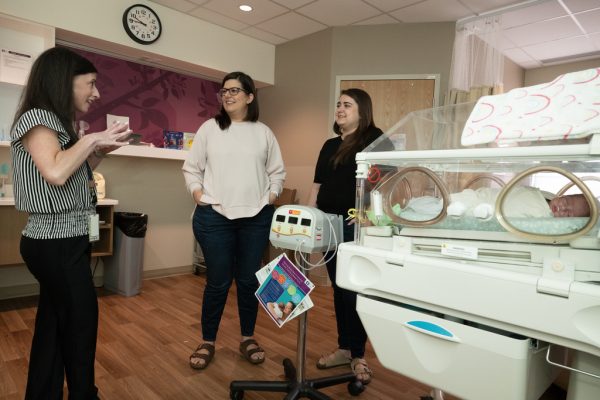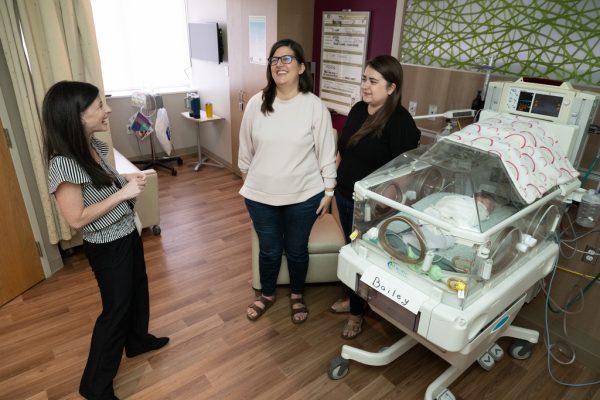When Bailey Aikens-Caceres entered the world, her moms weren’t ready. They didn’t have her nursery decorated. The car seat wasn’t installed, and they certainly weren’t expecting a hospital stay.
Born at 31 weeks due to a placental abruption, Bailey is currently in the Akron Children’s NICU getting stronger by the day.

Though Bailey’s birth mom Nikki became pregnant on their first attempt at IVF, the pregnancy had its share of complications.
“At week 13 or 14, I started to bleed,” Nikki said. As a result, she was referred to Maternal-Fetal Medicine at Akron Children’s to monitor a subchorionic hemorrhage. A subchorionic hemorrhage causes bleeding during the early stages of pregnancy. The bleeding usually stops on its own, and for Nikki that was the case.
However, on her next trip to Maternal-Fetal medicine, the team flagged some unusual things happening with her placenta.
“Once the doctors looked at the results, they had decided that the hematoma that I had was a little bit worse off than what they thought. So, they diagnosed it as placental abruption,” Nikki said.
The placenta provides oxygen and nutrients to the baby. In a placental abruption, the placenta detaches from the uterus too soon. Placenta abruptions can range from partial abruptions, where part of the placenta detaches from the uterus to total abruptions, where the placenta completely detaches from the uterus. This can cause severe bleeding for the mother and possible death for the baby.
So that began twice weekly appointments with Maternal-Fetal medicine to make sure things were progressing safely.
Eventually, Nikki ended up admitted to the hospital to make sure she’d be near medical care if she were to experience a total abruption. When her placenta did completely detach, Nikki was whisked to the operating room.
“You know that you might die and then you’re doing this thing. It’s so scary,” she recalled. “It was a very fast, lifesaving thing.”
Despite her traumatic birth experience and Bailey being admitted to the NICU, Nikki wanted to try to breastfeed.
“They wheeled in the pump, and we started pumping every two hours,” she said. “When you’re in a bed and you have a c-section, and you have to be in that position [to pump] it’s uncomfortable.”
Nikki’s first pumping efforts yielded some drops of breastmilk.
“We were able to swab very small amounts of breast milk. We could take them over to the NICU and we would do some mouth care with her to get her used to the breastmilk.”
Mouth care in the NICU with breastmilk helps lower the risk of oral infections. The protective substances in the breastmilk coat the mouth and other tissues. It helps keep harmful bacteria from sticking to the mouth and throat. It also helps babies get used to the taste and smell of their mother’s milk.
Soon, Bailey was able to take Nikki’s breastmilk through the tube in her stomach.
After Nikki was discharged, she was given a hospital-grade breast pump and supplies. But three weeks after discharge, Nikki noticed her breastmilk supply hadn’t changed despite frequent pumping, so she went to see Dr. Carly Dulabon at Akron Children’s Breastfeeding Medicine.
“She explained that she sees this quite often,” Nikki said, adding that people with traumatic births and NICU stays often experience low milk supply.
 “We talked about how there’s so many different things that can happen with a traumatic birth. One of the things was the massive amounts of blood loss and how that can have some effect on your brain and how that can affect your hormones and prolactin.”
“We talked about how there’s so many different things that can happen with a traumatic birth. One of the things was the massive amounts of blood loss and how that can have some effect on your brain and how that can affect your hormones and prolactin.”
Prolactin is the hormone that makes breasts produce milk.
“We did some blood work and found my prolactin level was really low,” Nikki said.
Dr. Dulabon put Nikki on a medication that could increase her supply, but it didn’t work. Now, Nikki is working with Dr. Dulabon to try an additional medication and some supplements.
“We’re so fortunate that we have someone like her to have that kind of conversation with,” Nikki said of Dr. Dulabon. “It’s also really convenient that we can be here, and I can run over to breastfeeding medicine for my appointments. It’s been great coming here. She came in and visited Bailey the other day after our appointment, so she’s really invested in care. She really cares.”
In addition to the support of Dr. Dulabon, Nikki says the support of her wife Nicole has been invaluable.
“When I was first out of surgery, I couldn’t get up to get supplies. I couldn’t get up to reach the pump. Couldn’t walk to get my parts sanitized, and I needed somebody there. Having that partnership there is important. It’s a two-person job,” Nikki said.
Nikki and Nicole want other parents who are struggling with breastfeeding to know they’re not alone.
“It can feel really discouraging, right? You want to do this thing, but your body’s not working. But it’s totally normal,” Nikki said.
“One thing people should be reminded of is that you are providing for your baby, you are doing good,” added Nicole. “So, when you get discouraged, remember any little bit is great.”
Nikki and Bailey have been working on breastfeeding in the NICU, practicing latching and kangaroo care.
Akron Children’s Breastfeeding Medicine helps breastfeeding parents with supply issues, painful feeding and much more, and families don’t have to be an Akron Children’s patient to use the service.
Make an appointment with Dr. Dulabon or a lactation consultant, here.










